CROSSROADS
The News Magazine of the African American Studies Department
UNIVERSITY OF MARYLAND
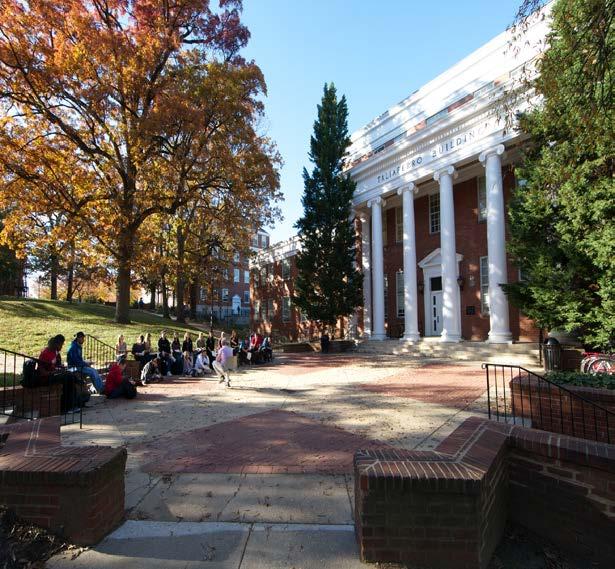
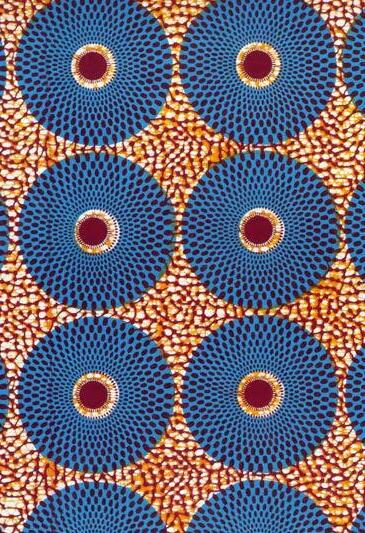






To fling my arms wide
In some place of the sun, To whirl and to dance
Till the white day is done. Then rest at cool evening Beneath a tall tree
While night comes on gently, Dark like me–That is my dream!
To fling my arms wide
In the face of the sun, Dance! Whirl! Whirl!
Till the quick day is done.
Rest at pale evening . . .
A tall, slim tree . . .
Night coming tenderly Black like me.
 Dr. Sangeetha Madhavan
Dr. Sangeetha Madhavan
2022 was a year marked by continued excellence in research and teaching by our faculty despite the ongoing challenges of COVID. Through cutting edge research supported by significant grant funding, our faculty are addressing a number of Grand Challenges facing the DMV, the country and the world. Thanks, in large part to our professional track faculty, we continue to offer courses that challenge UMD students to think critically about pressing issues that face our communities. The department has also maintained a robust engagement with the UMD community through a series of events that has brought scholars from other universities conducting innovative research on Black communities. One highlight was the Big Ten Academic Alliance African American Studies Workshop we hosted in June, that brought together chairs and faculty from our peer institutions to discuss common challenges and exchange ideas for shared growth of the field. Lastly, I am most indebted to our amazing staff who work tirelessly to support all the work of the department. It is with deep gratitude and pride that I invite you to read about the amazing work of the African American Studies Department in this news magazine.
Dr. Oscar Barbarin is the principal investigator for a project examining the relationship between disparities among young Black boys and exclusionary discipline practices in schools as early as pre-school. Dr. Barbarin hopes that findings from national and statewide data, in addition to individual case studies, will inform researchers looking to offer assistance to school districts. Interest is primarily focused on replacing practices like suspension and expulsion with a more effective disciplinary alternative.
Dr. Robert Choflet, along with Drs. Sharon Harley and Angel Dunbar, was awarded the 2022 Experiential Learning Grant from the University of Maryland’s Teaching & Learning Transformation Center. The grant will support the development and expansion of experiential learning opportunities for students in the department’s General Education courses, beginning with Black Culture in the US. The work this semester will focus on student research within cultural archives, including a trip to the National Museum of African American History and Culture. It will culminate with studentcurated black cultural life exhibits, to be presented to their peers.




Dr. John Drabinski presented two essays in the fall semester of 2022: “Life, Death, and Futurity in the Work of Achille Mbembe” in an edited collection on political theory in the black Atlantic and “Citing and Siting the Postmodern: Lyotard and the Black Atlantic,” in a volume on the work of Jean-Francois Lyotard. In Spring of 2022, Dr. Drabinski launched a podcast entitled Conversations in Atlantic Theory with collaborators Fatima Seck, a doctoral student in Comparative Literature at the University of Maryland and Keisha Allan, Assistant Professor at Baruch College. The podcast focuses on “books and ideas generated from and about the Atlantic world”.

Dr. Cecily Hardaway published “Beyond role strain: Work–family sacrifice among underrepresented minority faculty” with co-authors Dr. Ruth Zambrana (Professor in the Harriet Tubman Department of Women, Gender, and Sexuality Studies at the University of Maryland) and Dr. Leah Neubauer (Associate Professor of Preventive Medicine at Northwestern University). The study, published in the Journal of Marriage and Family, describes the work–family experiences of underrepresented minority professionals. Additionally, Dr. Hardaway was a panelist at the Consortium of Race and Gender Scholars discussion on “Innovative Ways to Research Social Equity,” sponsored by the George Washington University, Trachtenberg School of Public Policy and Public Administration.

Dr. Sharon Harley, principal investigator of the Andrew W. Mellon Foundation-funded project, “Race/Ethnicity and Gender in a Shifting Demographic and Racial Climate in the Black/African Diaspora,” invited students and fellow researchers to participate in a summer seminar at the Nkrumah Institute of African Studies at the University of Ghana. The workshop consisted of meetings and public events that offered nuanced perspectives and understandings of racial and ethnic identities and gender issues in the Black/African diaspora. Dr. Harley is also completing a book (Yale University Press) about Nannie Helen Burroughs, a noted suffragist, black feminist church leader, and an outspoken advocate for racial justice. In 2022, she received the 2022 Saint Mary-of-the-Woods College Distinguished Alumni Award .

Dr.George Kintiba made two notable presentations during 2022. His Brown Bag Lecture, “Black Soldiers in French War of Liberation,” focused on the experiences of Black soldiers from African colonies and Caribbean overseas French territories post French liberation in WWII. Additionally, Dr. Kintiba served as one of three panelists for “Decolonizing the (Un)Commonwealth: PanAfrican Perspectives on the Movement for Reparations and the Legacy of Colonialism.” The goal of the panel was to explore how reconnecting people of African descent can occur through intercultural awareness, exchange, enrichment, and studentcentered education experiences. Dr. Kintiba spent some time in Spanish Town, Jamaica, interviewing community members for a book project in collaboration with a colleague from Florida State University. The project focuses on resilience, religion, and therapy in English speaking Caribbean.
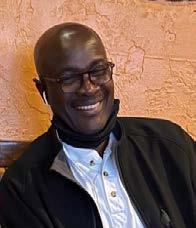



Dr. Sangeetha Madhavan is principal investigator of the JAMO Project, a five year study funded by the National Institutes of Health. The project focuses on determining the extent to which kinship support and marriage benefit children in urban subSaharan African settings. She spent two weeks in February and part of the summer in Nairobi, Kenya, conducting training for Wave 2 data collection of the JAMO project. Dr. Madhavan was joined on these trips by UMD colleagues as well as the Kenyan collaborators. Additionally, Dr. Madhavan is the recipient of the 2021-2022 Seed Grant from the Maryland Population Research Center for the JAMO Project. She has also started her term as a reviewer for a Study Section at the National Institutes of Child Health and Human Development.

Dr. Ashley Newby spent much of 2022 coming into her new role as Director of Undergraduate Studies. In between the business of undergraduate-centered work and finalizing exciting new lecture material, Dr. Newby presented a Brown Bag Lecture titled “Passing the Aux Cord: Co-Constructing Knowledge in the College Classroom Through Hip-Hop.” Here, she lead engaging discussions on Hip-Hop music and culture through reviewing playlists, guiding on composition within the genre, and addressing how to convey ideas in a unique manner.

Dr. Jason Nichols presented a Brown Bag Lecture titled: “And the White Man Gets Paid off All That: Kanye West, Mental Health, Black Manhood and Materialism.” Here, he explored topics such as Kanye West and understanding racial capitalism, heteronormative Black masculinity, materialism, and the overall impacts of mental health. On October 6th, 2022, Dr. Nichols published a piece in Newsweek on the significance of Justice Kentaji Brown and his thoughts on her role in the Supreme Court. Dr. Nichols hosts a podcast titled “Vince and Jason Save the Nation,” which is a left-right political debate show that “grapples with America’s most pressing questions.”
Dr. Joseph Richardson
Dr. Dr. Joseph Richardson

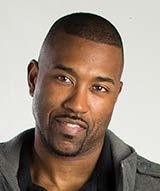
Dr. Joseph Richardson was selected to screen his film, “Life After the Gunshot,” at the 2022 DC International Film Festival. The film explores the impact of the healthcare and criminal justice systems through conversations with young Black men who have survived and endured gun violence. The project and film was created with the help of violence intervention specialist and gun-violence survivor, Che Bullock. Additionally, Dr. Richardson was honored as the keynote speaker at the Rutgers New Jersey Gun Violence Research Center, Gun Violence Research Day. His presentation focused on the relationship between structural violence and interpersonal violence among Black men. Dr. Richardson holds an appointment as inaugural MPower professor for his commitment and research to improving the lives of victims of gun violence. On October 17th, Dr. Richardson delivered the UMD Homecoming “Beyond the Field” address focused on the impacts of gun violence on Black communities.
Dr. Mike Wagner


Dr. Chinyere Osuji joined AFAM as an Associate Professor at the University of Maryland this year. She is the author of Boundaries of Love: Interracial Marriage and the Meaning of Race, a book focused on 47 black-white couples in two large cities, Los Angeles and Rio De Janeiro. In 2022, Dr. Osuji embarked on a new research project focused on first and second-generation African immigrants in the nursing profession. She hopes that this project will offer new insights to understanding the racial politics of healthcare and the role of nursing in addressing health inequities. In addition to her research, Dr. Osuji hosts a podcast titled “Dr. Chi’s Sa-lon” in which she explores politics, culture, and society.

AFAM welcomes Dr. Osuji as an Associate Professor at the University of Maryland. Dr. Osuji is the author of Boundaries of Love: Interracial Marriage and the Meaning of Race, a book largely focused on 47 blackwhite couples in two large cities, Los Angeles and Rio De Janeiro. As of 2022, Dr. Osuji has embarked on a new research project focused around first and second-generation African immigrants in the nursing profession. She hopes that this project will offer new insight to under-
AFAM welcomes Dr. Osuji as an Associate Professor at the University of Maryland. Dr. Osuji is the author of Boundaries of Love: Interracial Marriage and the Meaning of Race, a book largely focused on 47 blackwhite couples in two large cities, Los Angeles and Rio De Janeiro. As of 2022, Dr. Osuji has embarked on a new research project focused around first and second-generation African immigrants in the nursing profession. She hopes that this project will offer new insight
Dr. Shane Bolles-Walsh is committed to fostering positive student life at the University of Maryland. Having spent the last two years on the Senate Student Conduct Committee, he now looks forward to another two years with the Senate Equity, Diversity, and Inclusion (EDI) Committee, which actively promotes equity, diversity, and inclusion, including policies on non-discrimination and accessibility. Outside of student life, Dr. Bolles-Walsh is looking forward to planning a special event for Black History Month, as well as assembling a proposal for a book-length version of his dissertation titled Colossus of Rutgers: The Visual and Print Media Legacy of Paul Leroy Robeson.

Dr. Mike Wagner spent part of the summer in Nairobi, Kenya alongside colleague Dr. Sangeetha Madhavan working on the JAMO project. This was Dr. Wagner’s first trip outside the United States, and he was accompanied by his wife, Erika. They became particularly close with their tour guide, whose granddaughter is preparing to apply to the University of Maryland. Dr. Wagner is mentoring her through the application process. Additionally, Dr. Wagner devotes part of his time to working with Dr. Jessica Magidson, an Associate Professor in the Department of Psychology.


Dr. Dunbar is an Assistant Professor in the African American Studies Department. As a developmental scientist, her research focuses on understanding the unique developmental challenges that children of color encounter, encompassing the family processes and individual factors that influence positive adaptation in the face of these challenges.
This year, Dr. Dunbar served as the lead author for several papers, including one that explored the underlying mechanisms by which “racism degrades mental health.” The primary goal of the study was to see not only how mothers and children work through racism together after listening to a racist scenario, but determine what type of dynamic contributed to better self-identity, decreased depression and decreased problem behaviors. Results determined that girls responded better to mothers who were warm and offered positive physical responses such as touching, smiling, and hugging whereas boys responded better to parents who were much more “nononsense.” Both groups benefited from a mother who encouraged their child to problem solve, served as an advocate, and talked through the situation in detail.
2022 was a big year for Dr. Angel Dunbar. Between multiple studies published and
In another recently published study, Dr. Dunbar explored how parents can help their children regulate emotions. This is a particularly important issue for Black families and their kids –especially boys – whose emotions can often be misinterpreted as angry or violent, even when they are displaying a neutral expression. As a result, many Black parents prefer their child have lower than average behavior problems because their behaviors are so very often misperceived in negative ways.

What seems to help are parents who use a balance of supportive language while also teaching behavior-suppression to ensure their children are not overdoing their emotional responses to events. She and her colleagues are interested in the types of conversations parents have with their children, such as holding discussions about not expressing themselves to the same caliber as others around them and explaining topics like discrimination.
“So what we found is that when parents are having these conversations with their children... this type of socialization really does help decrease behavior problems over time. But at the very same time, it may increase depression and anxiety.”
Digging deeper, Dr. Dunbar and her colleagues also consider the role of physiology, exploring biomarkers for resiliency versus those with markers for sensitivity. For children with these sensitivity biomarkers, it is more likely that even when their parents are creating that balance of sensitivity and suppression, they are still at greater risk for depression and anxiety.
So where does this leave us? Dr. Dunbar has a clear goal when it comes to this research, asserting that as long as we have the data, we can use it to inform greater intervention for helping parents.
She looks forward to contributing more research with a new grant from the NIH, which she plans to use by exploring how discipline in the classroom might impact suicidal thoughts and behaviors in young Black children.
However, her role in bettering the lives of Black children and families does not just stop at research. On a smaller scale, she seeks out communities where she can give talks to parents about new findings, using research to inform approaches to parenting. She currently serves on an auxiliary council for an all-boys school in D.C., where she looks forward to talking to parents about the research and what steps they can take to support their children.
“I love the stuff I do, I love working with Black families. They’re super resilient, super flexible in terms of what they have to do and most of the time, we have great outcomes. What we are trying to do in my lab and with my colleagues are how to observe…and use these data points to help those who are struggling.”

. . . s o w e decided t o c reate a
...so we decided to create a playlist use the QR code to listen.

“For me, it is important to focus on my involvement in the African American Studies department in order to not only understand and appreciate the intricacies and history of being black, but also how I can use this knowledge to best serve my clients in the field of social work. It is so essential to make genuine connections as a counselor or therapist, which includes being able to understand how cultural and racial/ ethnic backgrounds influence one’s daily life and identity. I also feel a growing responsibility to be educated on these topics, particularly in our current political climate.” –Danielle Teixiera, recipient of the John B. and Ida Slaughter Fellowship
“The focus on African American studies is important because misogynoir is the axis upon which this world turns. Engaging with the histories and plights of black people, especially those most marginalized within the community, is a necessary step towards liberation for everyone.” –Joy Anyanwu, recipient of the John B. and Ida Slaughter Fellowship

“I chose to focus on African American Studies to make a difference in my community. My AASP courses have given me the tools to be an advocate for my race and facilitate change for future generations.” –Isaiah Griffith, recipient of the John B and Ida Slaughter Fellowship
“My name is Taylor-Simone Johnson and I will be the recipient of the Dr. Rhonda M. Williams Undergraduate Scholarship Award. I chose to major in African American Studies because I felt it pertinent to learn more about the Black experience in America, outside of my own, and the history that comes with it. As this country becomes more culturally aware each day, I took it upon myself to do the work that is necessary to be apart of this change. Furthermore, after my academic career is complete, I intend on utilizing everything that I have learned and continue to fight for equity.” –Taylor-Simon Johnson, recipient of the Dr. Rhonda M. Williams Graduate Fellow Fund
“In my undergraduate education, it was important for me to focus on African American Studies because elementary and secondary education in the U.S. does a poor job of teaching Black History, and I aspire to create racially equitable public policies. My African American Studies education was paramount to my understanding of the rich and complex history of the Black community, full of culture, resilience, beauty, and humanity; the more I learned, the more I realized how much change is needed to dismantle systemic racism. It is imperative for me to understand the history and present systems that oppress Black people in the U.S., as I aim to work alongside others to address the racial disparities plaguing our society.” – Mira Morgan, recipient of the Dr. Rhonda M. Williams Undergraduate Scholarship
AFAM celebrates the work of the following scholarship recipients.“In the American school system, prior to entering a higher education, African American Studies is unfortunately neglected or often misinterpreted. Recognizing the importance of African American Studies inspires me to focus and prioritize it in my education, especially as a student on the pre law track. Above all, focusing on African American studies allows for both the recognition and understanding of past and present social, political, economical and racial issues.”–Chaviva Nicholas, recipient of the Veronica Coates Scholarship Fund in the Department of African American Studies
“As a Black studies scholar, this field has given me pause and disruption. Yet, at the same time, Black studies continue to heal, energize and enliven me, my memory, and my imagination in ways previously incomprehensible. I remember and I believe when the freedom of all Black people is actualized and realized, it will alchemize the rest of the world.”
–Katelin Ten, recipient of the Alford Family Current-Use Scholarship in Honor of Val Skeeter
The department recognizes the work of the following student researchers.
Kelechukwu Ahulamibe, Undergraduate Student, Kinesiology on the Pre-Medical Track – The Diverse Black Families Project, Dr. Cecily Hardaway
Melinda Davies-Cole, Undergraduate Student, Public Health Science –JAMO, Dr. Sangeetha Madhavan
Max Harnack-Eber, PhD Candidate, Department of Economics – JAMO, Dr. Sangeetha Madhavan
Erica Puentes Martinez , Alumni, Department of African American Studies –Mellon Diaspora, Dr. Sharon Harley
Sarah Scriven, PhD Candidate, Black Women’s Studies, Feminist Intellectual History – Mellon Diaspora, Dr. Sharon Harley

Fatima Seck, PhD Candidate, Comparative Literature –Conversations in Atlantic Theory, Dr. John Drabinski
John Smith, Alumnus and Faculty Assistant, Psychology and African American Studies – RWJF, Dr. Oscar Barbarin
Seung Wan Kim, PhD Candidate, Department of Sociology – JAMO, Dr. Sangeetha Madhavan
The department recognizes the following staff members for their positive energy, work ethic, and dedication to African American Studies.

Rachel Barcelona is the Graduate Assistant for Communications, producing the department newsletter and other professional writing projects. She is currently a full-time M.A. candidate for Speech Language Pathology.
Alysa Conway is the Graduate Administrative Assistant for the department. She is currently a full-time M.A. candidate in the Education Policy and Leadership program.
Marci Deloatch is the Administrative Coordinator of the Judge Alexander Williams, Jr. Center for Education, Justice and Ethics. Marci is an alumnus of AFAM, in addition to being one of the longest-serving members of the department.
Sharon Hodgson is the Director of Administrative Services. Sharon’s work ethic, positivity, and kindness are essential to the function of the department. Sharon is also an avid knitter and fosters retired racing greyhounds.
Rachel Schupbach is the Business Manager for the Department. She is a world-class team player, organizer and problem solver. Rachel holds both her bachelor’s and master’s degrees from UMD, and has worked in BSOS for over 8 years.
Marshal Washington is the Academic Advisor for the department, and is beloved by cohorts of students and alumni who seek him out for academic support as well as career planning. Marshal’s door is always open and his passion for working with students is central to the mission of the department.
Valerie Jones is the Administrative Assistant for the Judge AW Center. She has worked at UMD since 2016, and is currently enrolled in an undergraduate degree program at the University of Maryland Global Campus.

Brothers Harry Alford III and Thomas Alford established a $25,000 Alford Family Current-Use Scholarship in honor of Val Skeeter in African American Studies through the University of Maryland College Park Foundation, Inc. The currentuse fund will provide merit-based scholarships for undergraduate students majoring in African American Studies at UMD. Ms. Valencia Skeeter served as the Director of Administrative Services in AFAM for 25 years, dedicating hours of service, sharing valuable career expertise, and holding institutional knowledge with students, alumni, faculty, and fellow staff members.
Harry Alford III, received his bachelor’s degree from the African American Studies Department in 2007 and has built a career centered on supporting diverse entrepreneurs and driving innovation opportunities. Most recently, Alford co-founded Humble Ventures, which accelerates diverse startups. At the same time, he teaches “Strategies for Innovation and Entrepreneurship” in the Southern Management Leadership Program.

Judge Alexander Williams, Jr, dedicated to public service, served as a federal judge from 1994 to 2014, and currently teaches at Howard University School of Law. In 2022, the Center showcased its dedication to the holistic development of leaders and those committed to social justice, enterprise, and innovation. This year brought a wave of unique discussions, important ideas, and boundary-pushing events that opened perspectives and sparked critical thinking.
Through its commitment to education, the Judge AW Center amplified the voices of professionals aligned with the Center’s work. The Center highlighted important stories spanning from racial history of housing discrimination and the Senate’s historical anti-lynching hate crime bill to a preacher’s perspectives on the intersection of neuroscience and social justice.
On May 27th, 2022, the Center hosted its inaugural Social Justice Bootcamp in partnership with Frederick Douglass High School in Baltimore. The bootcamp is a way to facilitate opportunities for students to amplify their voices through social justice advocacy.
In 2022, Judge Williams Jr. served as the co-chair of the Maryland Citizens Redistricting Commission, which was the first independent commission with three representatives from each respective party in the state of Maryland.
The Center has flourished under the combined leadership of Director of Programs, Dr. Kameron Van Patterson and Director of Strategic Partnerships and Outreach, Karen Bond.
In response to the killings of George Floyd, Breonna Taylor, Ahmaud Arbery, and other African Americans by law enforcement, as well as the racially motivated murder of Lieutenant Collins at UMD, ABRI was created to support systemic change in racial equity within and beyond college campuses. Grounded in the behavioral and social sciences, the ABRI mission seeks to elevate the status and experience of African Americans. The initiative will engage in supporting scholarship, teaching, dialogues of all types and at all levels in order to fight anti-Black racism in our society.
Through a collaboration between the College of Information Studies and the School of Behavioral and Social Sciences, students will now be able to hone their interests in Big Data, social science and research, and the Black Community by majoring in Social Data Science with a track in African American Studies. The major will combine core requirements of Data Science with key courses from AFAM.
In June of 2022, the department hosted a two-day workshop funded by the Big Ten Academic Alliance. The event, which brought together faculty from African American Studies Departments in the Big Ten Academic Alliance, sought to create community and infrastructure for ongoing communication and collaboration. Attendees focused on four key concepts:
1. Creating a community of African American scholars and departments across the Big Ten Academic Alliance universities to learn and collaborate with one another
2. Re-imagining the role of AfricanAmerican studies in the 21st century university by identifying challenges and responding to opportunities
3. Increasing cooperation among our departments in order to enrich curricula and experiences of undergraduate students and facilitate scholarly collaborations
4. Sharing strategies for addressing problems endemic to interdisciplinary departments such as African American Studies
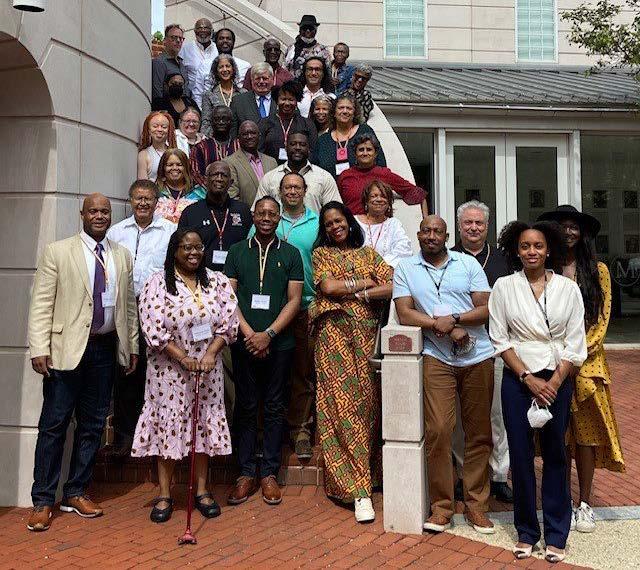
On February 9th, 2022, AFAM and the Harriet Tubman Department of Woman, Gender and Sexuality Studies welcomed Dr. Moore, who presented a lecture titled: “Black Sexual Minority Women and the Great Migration: The Search for Autonomy and Economic Freedom.” Dr. Moore is a Professor in the Sociology Department at Barnard College.
On February 28th, 2022, AFAM and the Anti-Black Racism Initiative hosted: “Programming Our Future: Creating a Racially Equitable Digital Economy.” This in-depth conversation featured panelists Dr. Nicol Turner Lee (Center for Technology Innovation), Dr. Jennifer D. Roberts (Associate Professor, Kinesiology, UMD), and Congressman Ro Khanna (17th District of California). Moderators included Dr. Rashawn Ray and Dr. Jason Nichols from the University of Maryland.
On February 24th, 2022, AFAM welcomed Dr. Clark as she presented a lecture: “Hip Hop and the African Diaspora.” Dr. Clark’s work examines hip-hop as a social commentary, especially around Pan Africanism and African Feminist Thought. Dr. Clark is an Associate Professor in the African American Studies Department at Howard University.

On March 3rd, 2022, The University of Maryland Office of the President, AFAM, and the School of Public Policy welcomed Heather McGhee for a special lecture titled: “Race and Inequality in America: A Conversation with Heather McGhee.” Ms. McGhee is also the author of New York Times Best-Seller, The Sum of Us: What Racism Costs Everyone and How We Can Prosper Together.
On April 7th, 2022, AFAM, the Department of Classics, Department of American Studies, and the Center for Literary Comparative Studies in the Department of English welcomed Dr. Hairstone as he presented his lecture: “All Roads Lead: Why We Study Classica Africana.” Dr. Hairstone is an Associate Professor of Interdisciplinary Studies at Wake Forest University.

On April 18th, 2022, AFAM welcomed the traveling exhibit, the “Tulsa Race Massacre” to its halls for a limited time. The exhibit focuses on the history of the Greenwood Area and the 1921 Tulsa Race Massacre, and has been created specifically for educating the community. More about this traveling exhibit can be found on their website.
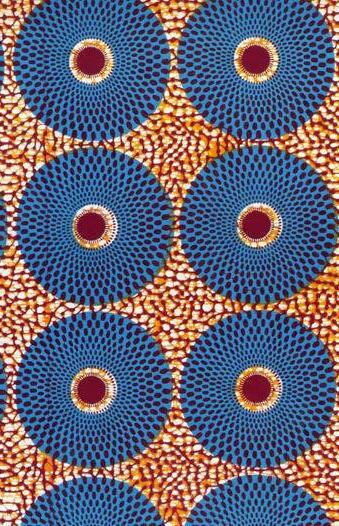
On April 20th, 2022, the Latin American and Caribbean Studies center from the College of Arts and Humanities, The Center for Literary and Comparative Studies from the Department of English, and AFAM welcomed Dr. Nesbitt as he presented his lecture: “The Price of Slavery: A Critical Conversation with Nick Nesbitt.” The discussion focused on his recently published book, The Price of Slavery: Capitalism and Revolution in the Caribbean, in which Dr. Nesbitt analyzes capitalist slavery using Marx’s Capital and its affiliation with the Caribbean revolution against colonialism.
On October 5th, AFAM, the Judge Alexander Williams Jr. Center of Education, Justice and Ethics, and the Nyumburu Cultural Center hosted a presentation titled: “Decolonizing the (Un) Commonwealth: Pan-African Perspectives on the Movement for Reparations and the Legacy of Colonialism” with Dr. Sangeetha Madhavan, Dr. George Kintiba, and Dr. Michael Williams. Dr. Williams is the director of the AYA Center for Intercultural Awareness and Development in Accra, Ghana.
On October 26th, AFAM and the Judge Alexander Williams Center for Education, Justice and Ethics welcomed Dr. Kristin Turney for a special discussion titled “The Waiting Game: The Pervasiveness and Proliferation of Anticipatory Stress During Jail Incarceration.” Dr. Turney is a Professor in the Department of Sociology at the University of California, Irvine.

On October 24th, AFAM and the Identity Group of Government and Politics (GIGGVPT) co-hosted a talk alongside the Latin American and Caribbean Studies Center with special guest Dr. Alecia McGregor. Here, she discuss her research on racial and discussed disparities in maternal healthcare. Dr. McGregor is an Assistant Professor of Health Policy and Politics at Harvard University.
On November 3rd, AFAM welcomed a panel consisting of Dr. Marie Thoma, Associate Professor, Department of Family Science; Dr. Sangeetha Madhavan, Elizabeth Thompson, Esquire, Lecturer, Georgetown University School of Continuing Studies; and moderator, Dr. Ashley Newby. The panel offered perspectives about the impact of the Supreme Court’s decision to overturn Roe v. Wade on Black and marginalized communities in the US and globally.
On November 10th, The Judge Alexander Williams, Jr. Center hosted Joseph L. Wright, the inaugural Chief Health Equity Officer of the University of Maryland Medical System, to present for their 4th annual lecture. The lecture series is dedicated to recognizing those individuals and organizations whose exemplary commitment to education, ethics, and justice inspire excellence and promote the advancement of equity, pluralism, civic discourse, and democracy.
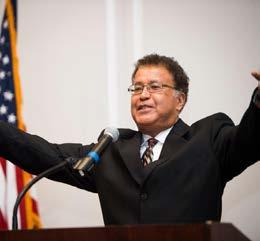

Dr. La Marr Jurelle Bruce, Associate Professor, Department of American Studies
On September 14th, AFAM welcomed Dr. Bruce for a presentation on his work-inprogress, “The Afromantic”, which explores “Afromance”, the structure of feeling and way of life that centers sorrow, honoring the grief that often haunts blackness, even as it is driven by ecstatic feeling, utopic dreaming, and a will to love.
Dr. Brooklynn Hitchens, Assistant Professor, Department of Criminology and Criminal Justice
On October 12th, AFAM welcomed Dr. Hitchens as she presented her ongoing, collaborative research on how the public health epidemic and urban gun violence has collateral consequences for low-income Black women and girls.
On November 16th, AFAM welcomed Dr. Johnson, whose work examines racial disparities in political behavior in democracies that are stratified by race. He has a particular interest in how historical and contemporary patterns of racial inequality affect the political behavior of people of African descent in Latin America.



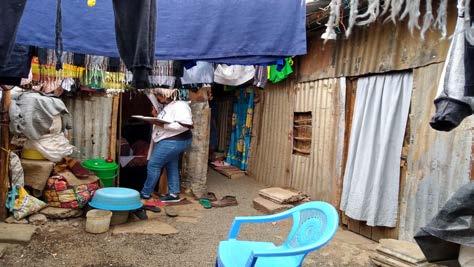


On behalf of the faculty, students, and staff of the African American Studies Department, we would like to acknowledge the generosity of those who make our endowed funds and scholarships possible. These resources allow us to support students and enrich the intellectual life of our department and the campus community. Through their annual and long-term support, we are able to communicate our mission widely and raise our visibility on campus and beyond.